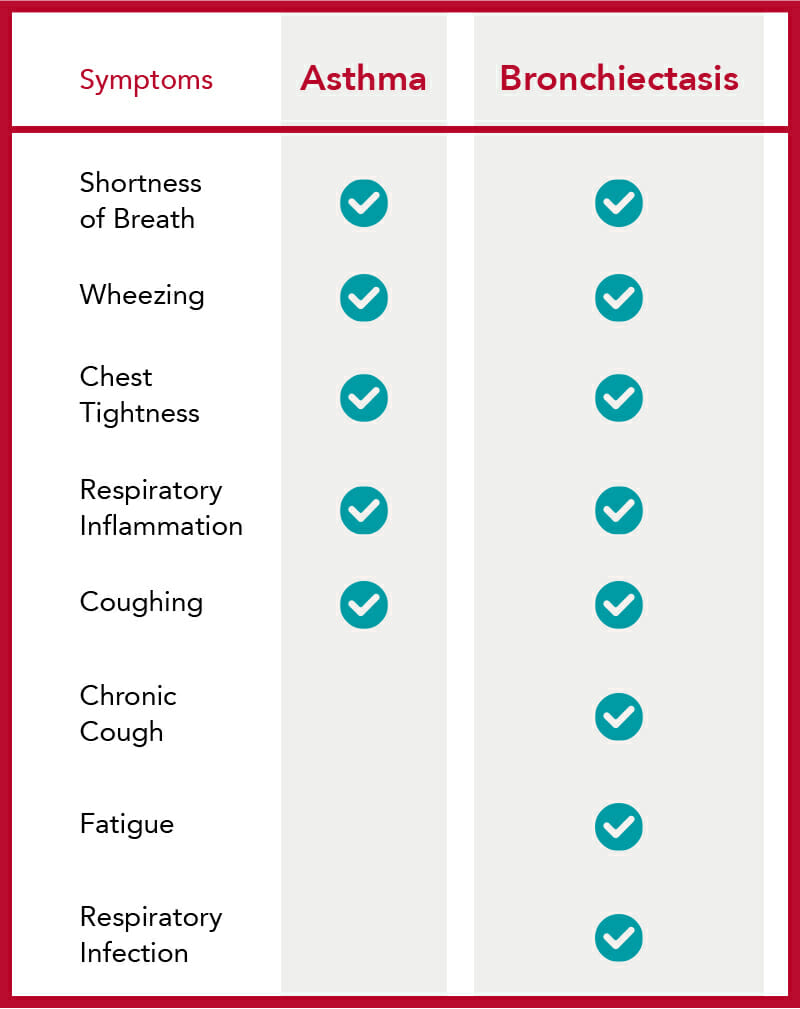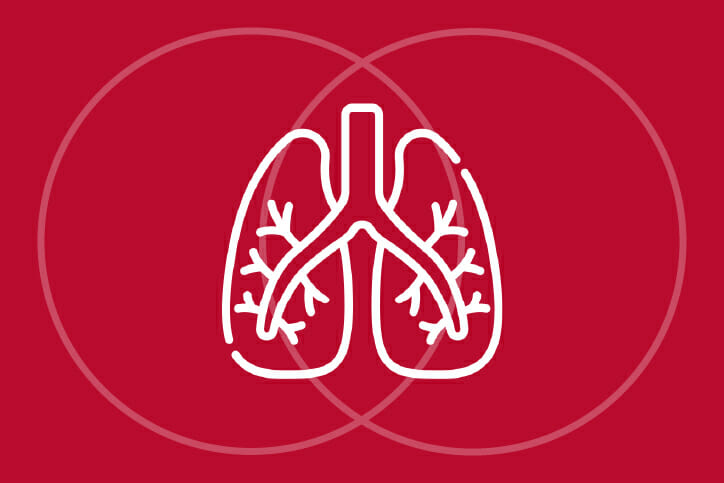
Bronchiectasis and asthma are two distinct respiratory conditions, but recent studies have shown a higher prevalence of bronchiectasis symptoms in patients with severe asthma.1
Known as asthma-bronchiectasis overlap syndrome (ABOS), ABOS is becoming increasingly recognized by healthcare professionals as a complex condition that can be challenging to diagnose. As a result, patients may not receive adequate treatment for addressing asthma and bronchiectasis symptoms individually.
In this article, we’ll discuss the similarities and differences between bronchiectasis and asthma, provide the latest findings on ABOS, and discuss how to talk to your doctor if you’re experiencing an overlap of symptoms.
Table of Contents
- Bronchiectasis and Asthma Similarities
- How These Conditions Differ
- New Research on ABOS
- When To Talk to Your Doctor
- Airway Clearance May Help
Bronchiectasis and Asthma: How Are They Similar?
 Bronchiectasis (brong-kee-EK-tuh-sis) is a chronic lung condition that causes the airways to become damaged and abnormally widened, due to repeated respiratory infection. The permanent damage makes it difficult for your lungs to mobilize and clear mucus independently.
Bronchiectasis (brong-kee-EK-tuh-sis) is a chronic lung condition that causes the airways to become damaged and abnormally widened, due to repeated respiratory infection. The permanent damage makes it difficult for your lungs to mobilize and clear mucus independently.
Symptoms may include:
- Shortness of breath
- Chronic cough
- Wheezing
- Chest Tightness
- Respiratory Inflammation
- Respiratory Infection
Asthma, another chronic lung condition, is characterized by inflammation and narrowing of the airways.
Symptoms may include:
- Wheezing
- Coughing
- Chest Tightness
- Shortness of breath
It’s reported that 1 in 13 Americans are living with asthma, which can develop at any age.2 Although asthma does not typically cause repeated respiratory infections like bronchiectasis, patients can develop infections, especially if their condition is left untreated and symptoms worsen (i.e., flare up).
It’s important to remember that everyone will experience asthma or bronchiectasis differently. For example, if asthma is well-controlled, a person may experience fewer or no symptoms at all for longer periods of time.3
Other Notable Similarities
- More Common in Women: Women are more prone to developing symptoms of asthma4 and bronchiectasis.5
- Permanent Condition: There is currently no known cure for either asthma or bronchiectasis.
- Symptoms Can Be Triggered: Environmental and external factors—such as cold weather, air pollutants, or smoking—may trigger a worsening of symptoms for both asthma6 and bronchiectasis.7
- Symptoms Can Be Managed: Depending on your individual symptoms and health history, your clinician can prescribe an effective treatment plan to help you manage each condition and still live a healthy, active lifestyle.
Differences Between Asthma and Bronchiectasis
Though similar in chronic symptoms, asthma and bronchiectasis affect the airways differently:

Asthma: Asthma can cause the airways to become inflamed and narrowed, impairing the body’s natural flow of oxygen.8
Bronchiectasis: Bronchiectasis causes the airways to become damaged and abnormally widened, affecting your lungs ability to mobilize and clear mucus. This results in recurring inflammation and infection.
Another key difference is how your clinician will diagnose your condition.
Diagnosing Asthma
Similar to how COPD is diagnosed, your doctor may perform a series of lung performance tests, such as a spirometry test or blood tests to help determine the causes of your symptoms.9
Diagnosing Bronchiectasis
There is only one way to accurately diagnose bronchiectasis: a high-resolution computerized tomography (HRCT) scan. This allows your clinician to produce a 3-D rendering of your lungs to detect lung damage associated with this condition.
Treating Asthma
Your doctor may prescribe a combination of short-term and long-term medications to assist you with managing your symptoms on a daily basis or when you experience a flare-up, also known as an asthma attack.
Treatment options typically vary based on your age, the severity of your asthma, and your response to a specific treatment. Your doctor may adjust your treatment approach until your asthma symptoms are under control.10
Treating Bronchiectasis
Unlike a person who may experience their asthma symptoms only when triggered by allergies, climate conditions, or pollutants, bronchiectasis requires daily management to help relieve symptoms and prevent exacerbations (i.e., worsening of symptoms).
With that said, it’s not uncommon for clinicians to prescribe similar treatments for asthma and bronchiectasis, such as:
- Bronchodilators to help prevent the narrowing of the airways
- Antibiotics to help treat infections from flare ups
- Other medications that help reduce inflammation in the lungs
Can Bronchiectasis and Asthma Overlap?
Although these two conditions have different underlying mechanisms, they are often mistaken for each other due to the many shared symptoms.
In 2018, a study was conducted on 398 patients experiencing uncontrolled asthma to determine the prevalence of bronchiectasis and identify risk factors and their correlation with bronchiectasis in these patients.
According to its findings, of all the patients diagnosed with moderate-to-severe asthma, nearly one-third of them also suffered from bronchiectasis. This coexistance was also linked to a higher occurrence of chronic expectoration, more severe asthma symptoms, at least one previous episode of pneumonia, and lower levels of FeNO—a diagnostic tool used to diagnose asthma.11
Later in 2021, a systematic review and meta-analysis of five observational studies on bronchiectasis prevalence in asthma patients reported that, again, bronchiectasis prevalence was higher in patients with severe asthma symptoms.12
New Research on ABOS
A more recent analysis has helped shed light on the overlap between asthma and bronchiectasis, suggesting that prevalence of bronchiectasis in asthma patients is higher than expected, especially those with severe asthma.
Its analysis concludes that available evidence supports the existence of an overlap between asthma and bronchiectasis and notes that, in some patients—between 1.4% and 7%—asthma alone could be the cause of bronchiectasis. However, more consistent longitudinal studies will need to be conducted to demonstrate that severe asthma may cause bronchiectasis to develop.
When To Talk to Your Doctor
If you’re living with asthma and are experiencing severe symptoms such as chronic cough, breathlessness, and recurrent lung infections, you’ll need to talk to your clinician about getting a HRCT scan. This is the only way to properly diagnose bronchiectasis.
Untreated ABOS means you’re not getting adequate treatment, which can lead to a worsening of symptoms that may require hospitalization. Therefore, it’s crucial to seek medical attention if you think you may be experiencing a comorbid condition.
Your doctor can work with you to develop an individualized treatment plan that is tailored to your specific needs and ultimately help you manage your symptoms more effectively.
Airway Clearance May Help
High-frequency chest wall oscillation (HFCWO) therapy, via The SmartVest Airway Clearance System, is a non-invasive airway clearance technique that helps alleviate the symptoms of bronchiectasis and other chronic lung conditions that result in mucus buildup, inflammation, and lung infections.
SmartVest uses an inflatable vest that connects to an air pulse generator, which sends high-frequency vibrations to the upper chest wall. The vest gently squeezes and releases the chest wall, as each vibration helps to loosen the mucus buildup in the lungs, making it easier to cough up.
SmartVest can be used as part of an algorithm of care to provide a comprehensive approach to managing bronchiectasis and bronchiectasis prevalence.
Request a Patient Packet
 You can start learning more about SmartVest, its clinical evidence, and success stories, and share this information with your doctor by requesting a free informational packet!
You can start learning more about SmartVest, its clinical evidence, and success stories, and share this information with your doctor by requesting a free informational packet!
Resources:
[1] National Library of Medicine. “Does asthma-bronchiectasis overlap syndrome (ABOS) really exist?” Retrieved from https://pubmed.ncbi.nlm.nih.gov/37071539/
[2] Asthma and Allergy Foundation of America. “Asthma Facts and Figures.” Retrieved from https://www.aafa.org/asthma-facts/
[3] National Heart, Lung, and Blood Institute. “Asthma: Overview.” Retrieved from https://www.nhlbi.nih.gov/health-topics/asthma
[4] Asthma and Allergy Foundation of America. “Asthma Facts and Figures.” Retrieved from https://www.aafa.org/asthma-facts/
[5] American Lung Association. “Learn About Bronchiectasis.” Retrieved from https://www.lung.org/lung-health-diseases/lung-disease-lookup/bronchiectasis/learn-about-bronchiectasis
[6] National Heart, Lung, and Blood Institute. “Asthma: Risk Factors.” Retrieved from https://www.nhlbi.nih.gov/health-topics/asthma
[7] Bronchiectasis News Today. “6 Tips for Managing Bronchiectasis.” Retrieved from https://bronchiectasisnewstoday.com/2017/02/09/six-tips-for-managing-bronchiectasis/
[8] National Heart, Lung, and Blood Institute. “Asthma: Overview.” Retrieved from https://www.nhlbi.nih.gov/health-topics/asthma
[9] National Heart, Lung, and Blood Institute. “Asthma: Diagnosis.” Retrieved from https://www.nhlbi.nih.gov/health-topics/asthma
[10] National Heart, Lung, and Blood Institute. “Asthma: Treatment.” Retrieved from https://www.nhlbi.nih.gov/health-topics/asthma
[11] BMC. “Factors associated with bronchiectasis in patients with uncontrolled asthma; the NOPES score: a study in 398 patients.” Retrieved from https://respiratory-research.biomedcentral.com/articles/10.1186/s12931-018-0746-7
[12] National Library of Medicine. “Clinical features of asthma with comorbid bronchiectasis.” Retrieved from https://www.ncbi.nlm.nih.gov/pmc/articles/PMC7850679/
